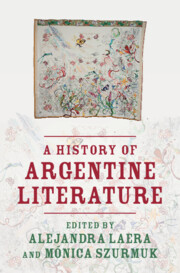Book contents
- A History of Argentine Literature
- A History of Argentine Literature
- Copyright page
- Contents
- Figures
- Contributors
- Editors’ Acknowledgments
- Introduction
- Part I Literary Dates
- Chapter 1 1536: The Creation of a Literary Space
- Chapter 2 1810: Patriotic Voices
- Chapter 3 1837: The Foundation of a National Literature
- Chapter 4 1884: A Literary Field in Formation
- Chapter 5 1910: A Modern Lettered City
- Chapter 6 1926: Traditions Old and New
- Chapter 7 1948: Culture and the State
- Chapter 8 1963: Experimentation and the Common Reader
- Chapter 9 1980: Memory and the Novel
- Chapter 10 2001: Argentine Narrative in the New Millennium
- Part II Critical Inroads
- Part III Literary Names
- Index
- References
Chapter 6 - 1926: Traditions Old and New
from Part I - Literary Dates
Published online by Cambridge University Press: 09 May 2024
- A History of Argentine Literature
- A History of Argentine Literature
- Copyright page
- Contents
- Figures
- Contributors
- Editors’ Acknowledgments
- Introduction
- Part I Literary Dates
- Chapter 1 1536: The Creation of a Literary Space
- Chapter 2 1810: Patriotic Voices
- Chapter 3 1837: The Foundation of a National Literature
- Chapter 4 1884: A Literary Field in Formation
- Chapter 5 1910: A Modern Lettered City
- Chapter 6 1926: Traditions Old and New
- Chapter 7 1948: Culture and the State
- Chapter 8 1963: Experimentation and the Common Reader
- Chapter 9 1980: Memory and the Novel
- Chapter 10 2001: Argentine Narrative in the New Millennium
- Part II Critical Inroads
- Part III Literary Names
- Index
- References
Summary
The year 1926 is a milestone for Argentine literature as it marked the publication of three books which represented a radical innovation for narrative prose: the novels Don Segundo Sombra, by Ricardo Güiraldes, and El juguete rabioso (The Mad Toy) by Roberto Arlt; and Horacio Quiroga’s Los desterrados (The Exiles), a short-story collection. These three books can be seen as a reconfiguration of a literature that, since its origins, had space as its privileged protagonist. Güiraldes’ novel postulates an idealized image of the countryside that, in the third decade of the twentieth century, was consciously anachronistic and nostalgic. In Arlt’s novel, the modern city is a symbol of novelty and even of the future, and also a constant source of irresolvable conflicts. In turn, the stories from Los desterrados, which take place in the frontier territory of Misiones, updated the fictional possibilities of the border understood as a contact zone. The publication of these three books in 1926, then, implied a renewal of the spaces privileged by Argentine literature: the countryside, the city, and the border. In addition, they are testimony to how the 1920s marked a definitive change in the ways of being a writer.
- Type
- Chapter
- Information
- A History of Argentine Literature , pp. 81 - 96Publisher: Cambridge University PressPrint publication year: 2024



